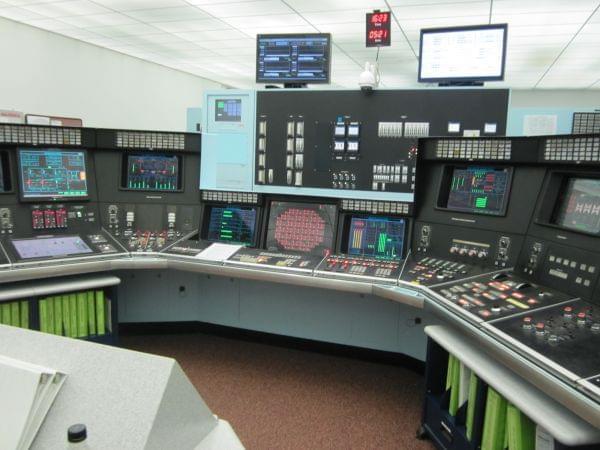Bill Raising Electric Rates To Help Clinton, Quad-Cities Nuclear Plants Heads To Governor’s Desk

A view of one of the control consoles at the training center of Exelon’s Clinton nuclear power station in DeWitt County. Jim Meadows/Illinois Public Media
The Illinois General Assembly is allowing electric utilities to collect more money from customers. The Future Energy Jobs Bill (SB 2814) approved by the Illinois House and Senate on Thursday is part of a deal in which Exelon Corporation has agreed not to close nuclear plants in Clinton and the Quad Cities for at least ten years.
Exelon says those two nuclear plants are no longer profitable. But that's not the case for the company overall. Last year it reported net income of $2.25 billion dollars.
That did not sit well with opponents, who call the rate hike a "bailout."
State Representative Mark Batinick (R-Plainfield) said during House debate on Thursday that too many colleagues have misplaced priorities, especially given the havoc resulting from the failure to enact a balanced budget.
"So we’re going to subsidize a company so they can sell their power out of state," Batinick says. "That’s supposed to be more important than social services? Than higher education? Than everything else?"
Supporters of the subsidy say it will save the jobs of 1,500 men and women at the two plants, thousands more at local businesses, plus millions of dollars a year in local property tax revenues. They also argued that if the two nuclear plants were to close, the drop in Illinois electricity supply would lead to a hike in rates beyond the legislation's subsidies.
The bills chief Senate sponsor, Chapin Rose (R-Mahomet) says that the message he heard from economists at a recent University of Illinois forum in Chicago.
"They tell me that the cost of doing nothing today will be extraordinarily expensive to ratepayers all over the state of Illinois", said Rose during Senate floor debate on Thursday. "And we have a chance to protect them.”
Rose's Senate district includes the Clinton nuclear plant. It's also in the House district of State Representative Bill Mitchell (R-Forsyth). Mitchell credits Governor Bruce Rauner with stepping into the negotiation procress, resulting in a bill that could win passage in the General Assembly.
"Governor Rauner, who’s never been known to be an anti-business type person says, 'no, we’ve got to protect the consumers'", said Mitchell, in remarks distributed by the House Republican Office. "'And we’ve got to protect the working people and manufacturers of this state". So we capped the increases. So this is far and away a better bill than it was just a week ago.
The caps in the legislation are a complicated formula meant to protect residential ratepayers. They cap the additional fees to save the nuclear plants at around 25 cents per month for ComEd customers and 35 cents per month for Ameren ratepayers. Critics say there are loopholes that could lead to higher bills.
In a statement issued Thursday night, Governor Rauner said the measure ensured that Exelon's Clinton and Quad-Cities nuclear plants will stay open. But at the same time, he said the built-in rate caps protected ComEd and Ameren ratepayers from future large rate increases. And he said the bill also made sure that taxpayeers would not be "on the hook to keep the power plants open and online."
Links
- Last-Minute Exelon Subsidy Plan Goes To Illinois House Floor
- State Rep. Mitchell Pleased Rauner Admistration Weighing In On Exelon Bill
- Changes To Measure To Help Exelon Plants
- Exelon Holds Out Hope For Legislative Solution
- Rauner, Lawmakers React To Exelon Closures
- Exelon to ‘Move Forward’ On Closure Of Clinton, Quad Cities Nuclear Plants
- Exelon Defers Decision To Close Clinton Plant For One Year
- Exelon Threatens Plant Closures
- Low-Carbon Bill Could Help Exelon Plants, Including Clinton

